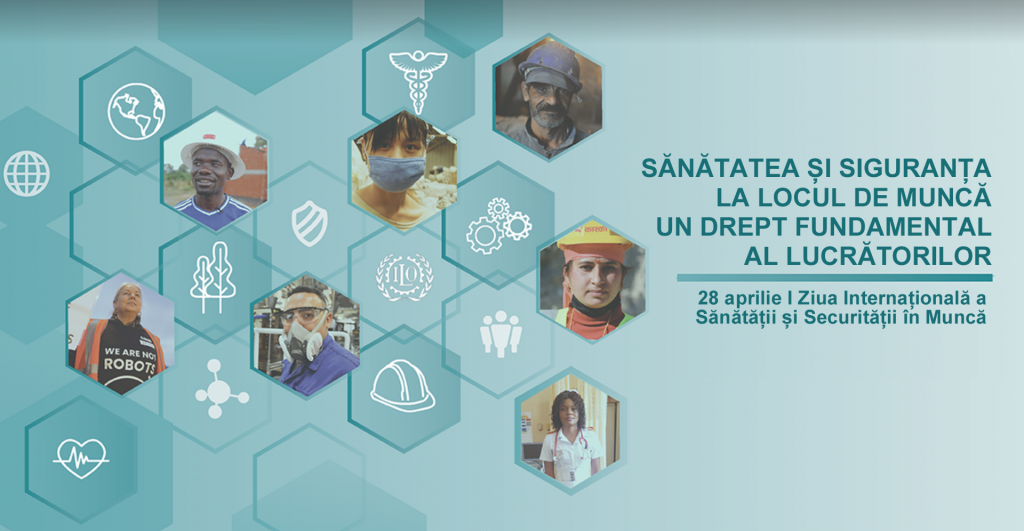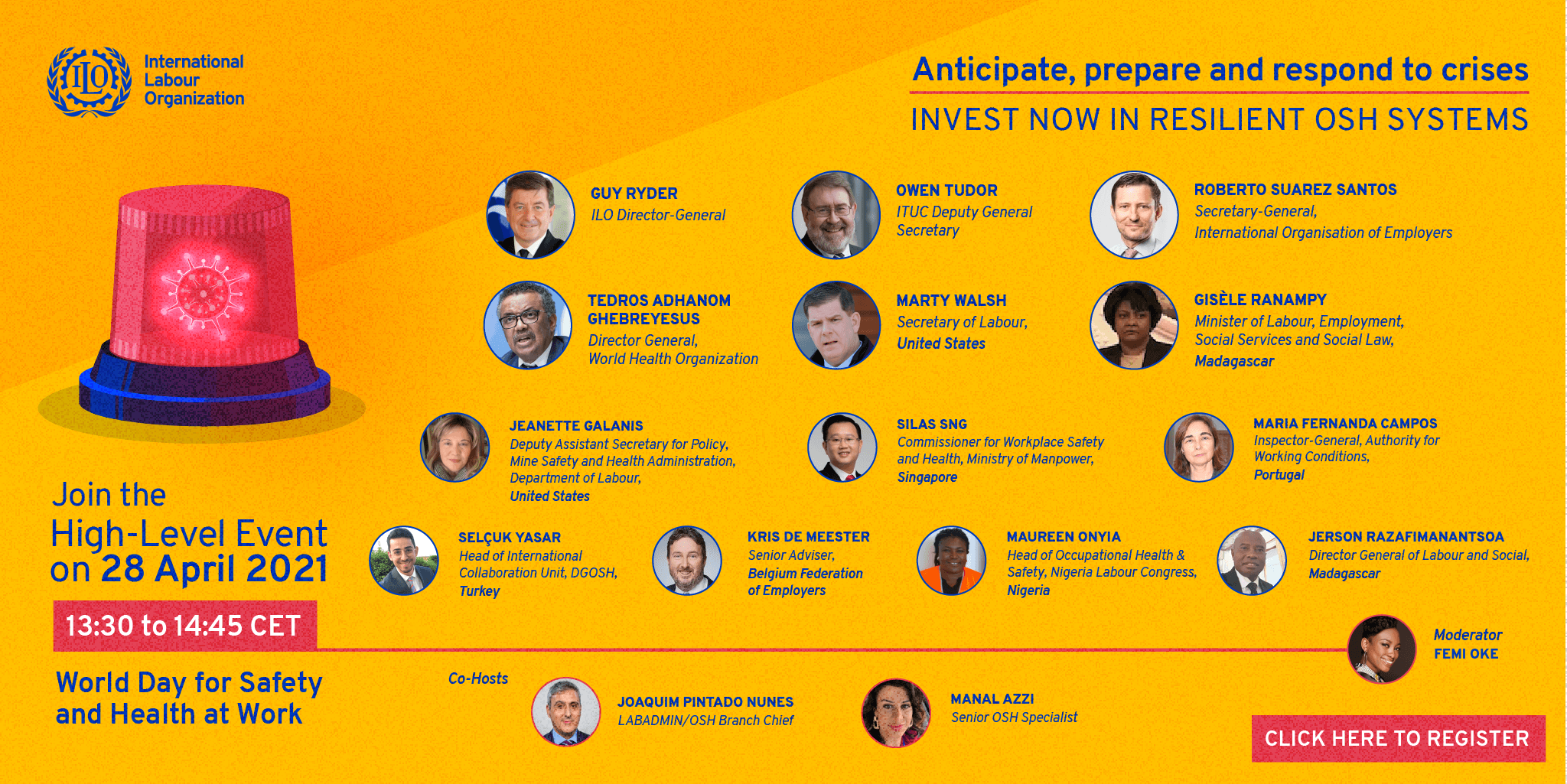
În fiecare an, mai mulți oameni mor la muncă decât în războaie. Majoritatea nu mor de boli misterioase sau în accidente “tragice”, ci pentru că angajatorii sau instituțiile statului nu consideră siguranța lucrătorilor o prioritate chiar așa de mare. Ziua de 28 aprilie este destinată comemorării acestor lucrători.
Ce reprezintă 28 aprilie?

28 aprilie – Ziua Internațională a Sănătății și Securității în Muncă, (cunoscută și sub numele Ziua Comemorării Victimelor Accidentelor de Muncă) s-a desfășurat întotdeauna sub deviza “ne pomenim morții, luptăm pentru cei vii”, iar sindicatele sunt îndemnate să se orienteze în ambele direcții, prin organizarea de evenimente de comemorare a celor care și-au pierdut viața la locul de muncă și în același timp pentru a se asigura că astfel de tragedii nu se repetă. Acest lucru se poate realiza cel mai bine prin întărirea organizațiilor sindicale și prin campanii pentru aplicarea mai strictă și cu sancțiuni reale pentru încălcarea normelor privind sănătatea și siguranța la locul de muncă. Ziua Internațională a Sănătății și Securității în Muncă este marcată în toată lumea și este recunoscută oficial de Guvernul României.
Tema anului 2021:
Sănătatea și siguranța la locul de muncă – un drept fundamental al lucrătorilor!
Anul acesta, pandemia Covid-19 a expus deficiențele majore privind sănătatea la locul de muncă din întreaga lume. Lucrătorilor li se refuză în mod obișnuit chiar și protecția de bază privind sănătatea și securitatea, inclusiv consultarea cu reprezentanții din comitetele de securitate și sănătate cu privire la politicile și practicile în contextul „Covid”, accesul gratuit la echipamente individuale de protecție și protecția împotriva victimizării pentru atragerea atenției asupra problemelor de sănătate și securitate. Aceleași probleme au existat înainte de pandemie și au dus la milioane de decese în fiecare an din cauza accidentelor de muncă și bolilor profesionale.
Pandemia demonstrează de ce sănătatea și siguranța trebuie să fie un drept pentru toți cei care lucrează. Printre cele peste 27.000 de decese cauzate de COVID-19 în România se află nenumărați lucrători, în profesii medicale și nu numai, care s-au infectat la locul de muncă. Deplângem pierderea lor și oferim condoleanțe și solidaritate celor dragi. Ne amintim și de cei care au murit în ultimul an din cauza cancerului cauzat de condițiile de muncă și a altor boli și accidente de muncă, de multe ori din cauza accesului restricționat la serviciile de sănătate în contextul pandemiei.
În timp ce vaccinarea oferă speranță, sănătatea și siguranța trebuie să rămână o prioritate absolută în lunile următoare și nu numai. Sănătatea și securitatea la locul de muncă nu sunt cadouri din partea autorităților sau a unui angajator bun: sănătatea și securitatea la locul de muncă este un drept al lucrătorilor. Un drept pentru care luptă sindicatele!
În Uniunea Europeană „fiecare lucrător are dreptul la condiții de muncă care îi respectă sănătatea, siguranța și demnitatea” (Carta drepturilor fundamentale a Uniunii Europene, art. 31). Legislația UE, prin Directiva-cadru privind securitatea și sănătatea în muncă, 1989:
- obligă angajatorii să ofere locuri de muncă sănătoase și sigure,
- solicită ca toți lucrătorii să fie protejați de legislația în materie de sănătate și siguranță, și
- asigură lucrătorilor dreptul la informare și consultare cu privire la sănătate și siguranță și la desemnarea reprezentanților pentru sănătate și securitate în muncă.
Aceasta înseamnă că angajatorii sunt responsabili pentru riscuri evidente, cum ar fi expunerea la substanțe periculoase, ridicarea de greutăți sau mișcări repetitive, precum și alte riscuri mai puțin recunoscute, cum ar fi stresul profesional sau hărțuirea.
În ciuda drepturilor clare, sănătatea și siguranța sunt departe de a fi o realitate pentru toți lucrătorii. Mulți lucrători nu au reușit să se distanțeze social. Lucrul de acasă presupune alte riscuri, cum ar fi creșterea violenței domestice (cu o treime în unele țări ale UE în timpul carantinei), ore prelungite de muncă sau lipsa echipamentelor adecvate la domiciliu.
Sindicatele și reprezentanții ssm joacă un rol vital în asigurarea sănătății și securității. Orice persoană care lucrează căreia îi pasă de propria sănătate și siguranță la locul de muncă ar trebui să adere la un sindicat și să afle dacă are un reprezentant pentru ssm. Un sindicat puternic se poate asigura ca un reprezentant pentru sănătate și siguranță este numit și ascultat de conducere.
Sindicatele luptă și pentru o mai bună legislație privind sănătatea și siguranța la locul de muncă. La nivel european, sindicatele au obținut limite de expunere profesională pentru multe substanțe cauzatoare de cancer și luptă pentru a obține limite mai dure și pentru mai multe substanțe. Sindicatele militează pentru obligații legale mai puternice impuse angajatorilor pentru a combate stresul și durerile de spate (și alte așa-numite tulburări musculo-scheletice). Sindicatele presează, de asemenea, ca Organizația Internațională a Muncii (OIM) să pună în aplicare decizia adoptată de Conferința centenară a OIM din 2019, pentru a face din securitatea și sănătatea în muncă un drept fundamental la locul de muncă.
Pe 28 aprilie 2021, sindicatele trimit un mesaj potrivit căruia protecția sănătății și securității la locul de muncă trebuie recunoscută ca un drept pentru toți! Fie că este vorba de Covid sau de cancer profesional, de accidente la locul de muncă sau boli industriale, fiecare lucrător ar trebui să aibă dreptul la protecție. Nimeni nu ar trebui să moară pentru a-și câștiga existența.
Acțiuni
În această zi, lucrătorii reuniți în sindicate organizează evenimente, demonstrații, comemorări și o varientate întreagă de alte activități. Este de datoria noastră să nu lăsăm această zi să treacă neobservată și este la alegerea noastră cum dorim să o marcăm. Câteva idei de acțiuni puteti găsi mai jos:
- Un minut de tăcere la locul de muncă în decursul zilei;
- Implicarea consiliului local sau altor institutii publice in actiuni de marcare a evenimentului;
- Un eveniment cum ar fi plantarea unui copac memorial într-un loc public, plasarea unei plăci comemorative, dedicarea unei sculpturi, unei piese de artă sau chiar a unei bănci în amintirea lucrătorilor care au fost uciși la locul de muncă sau din cauza condițiilor de muncă;
- Cereți centrelor religioase locale să includă Ziua Comemorarii Muncitorilor decedati în slujba lor în această zi;
- Distribuiți panglici violet cu mesajul “nu-ma-uita”, acesta fiindsimbolul Zilei Comemorarii Lucrătorilor Decedati
- Puteti folosi contul personal deFacebook sau Instagram pentru a face o postare cu referire la semnificatia zilei de 28 Aprilie, etc
Orice altă manifestare menită să atragă atenția asupra semnificației zilei de 28 Aprilie este bine venită. Resurse și actualizări privind evenimentele dedicate zilei de 28 aprilie sunt disponibbile pe site-ul web: www.28april.org
https://www.cartel-alfa.ro/ro/ziua-interna%c8%9bionala-a-sanata%c8%9bii-%c8%99i-securita%c8%9bii-in-munca-79/?fbclid=IwAR1cAps1RofgPhHxDhyZKo-v-HJPhjSdIkl0Vd_-jnfylAi5juN4Q0BsXGc




